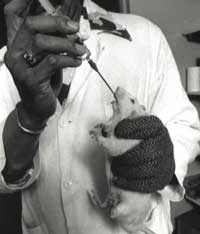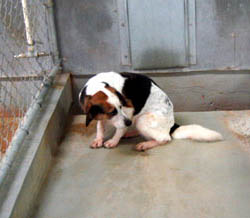|
Perhaps there are a few people out there who buy baby shampoo for themselves just because it has a cute picture on the label, or because they have about as much hair left as a baby. But most people buy it because they think it's safer for their child.
Many shampoos and other personal-care products undergo safety testing before they're made available to consumers. This can include exposing animals to the compound to see whether they develop skin irritations or get sick. Animal testing for pharmaceuticals is even
 more perilous—animals are often intentionally given diseases to see (a) whether a new drug will have an effect on the disease, and (b) whether the drug has any serious side effects. Test animals may develop tumors or other nasty conditions, and are often killed intentionally at some point in the test so scientists can examine the animals' innards for signs of damage.
more perilous—animals are often intentionally given diseases to see (a) whether a new drug will have an effect on the disease, and (b) whether the drug has any serious side effects. Test animals may develop tumors or other nasty conditions, and are often killed intentionally at some point in the test so scientists can examine the animals' innards for signs of damage.
Egad! All that for the rainbow assortment of pills, ointments, and hair goop in our medicine cabinets? Is there another way? Read on...
On a purely logical level, ethics would seem to dictate that the species that wants to use a potentially harmful chemical (we humans)—whether the chemical is destined for a cosmetic, a cleaning product, or a pharmaceutical—should supply the test subjects that undergo the safety tests (i.e. human test subjects). It seems unethical that the "user species" would impose the fear, pain, and health consequences of the testing on an unwitting, unwilling species. Indeed, human trials of new drugs are done all the time, but that's AFTER the pharmaceutical has already been tested on myriad laboratory animals.
The issue of animal testing is a fundamentally ethical one. Years ago, the public was outraged over exposés about the abuse of test animals,
 and many consumer-goods companies abandoned animal testing for their products. Did they simply stop testing their goops and glops before putting them on the shelf for sale? Of course not! They instead developed non-animal testing methods that are as good or better at evaluating product safety. For instance, eye irritation for a chemical might be tested on donated human retinas, and cultured human skin can be used to evaluate skin reactions. Unfortunately, there is still plenty of animal testing going on for a variety of products.
and many consumer-goods companies abandoned animal testing for their products. Did they simply stop testing their goops and glops before putting them on the shelf for sale? Of course not! They instead developed non-animal testing methods that are as good or better at evaluating product safety. For instance, eye irritation for a chemical might be tested on donated human retinas, and cultured human skin can be used to evaluate skin reactions. Unfortunately, there is still plenty of animal testing going on for a variety of products.
Many animal rights activists pursue an end to all animal testing. Other organizations argue for the three Rs:
- Replace the use of animals in scientific procedures with non-animal alternatives whenever possible;
- Reduce the number of animals used in any animal-testing procedure;
- Refine procedures so that animals experience less pain, suffering, or discomfort.
At this point in history, we're in no danger from the shampoos, detergents, and cosmetics we find on a supermarket shelf. If a company thinks it's necessary to develop something new in those areas, we suspect that most people would agree that animal tests are not necessary, and that if the manufacturer thinks there could be any danger from one of the ingredients in their new product, they should use scientifically sound non-animal testing. (Or, here's an outrageous idea—they should choose a known safe ingredient instead of that unknown, possibly unsafe ingredient!)
What about other types of chemicals; for instance, new drugs? Are we ready to let inter-species ethics trump our desire for new pills that can fix whatever ails us? Some of us may be, others may not be.
Chemical pesticides present another side of the ethics questions regarding animal testing. When setting a safety limit for human exposure to a particular compound, federal regulations require an additional "safety factor" above the level that was shown to be hazardous
 to lab animals. Pesticide manufacturers have proposed testing their chemicals on human subjects to determine more precise levels of (supposedly) safe human exposure, hoping that the levels will be more generous than those dictated by the animal-based tests.
to lab animals. Pesticide manufacturers have proposed testing their chemicals on human subjects to determine more precise levels of (supposedly) safe human exposure, hoping that the levels will be more generous than those dictated by the animal-based tests.
Critics labeled this an outrageous idea, saying that we should never intentionally expose humans to potentially unsafe levels of toxic pesticides. Sounds right on the surface, but is it any more acceptable to do the same tests (or worse) on unsuspecting animals? You can at least argue that the human test subjects would have a choice and would be paid, whereas the animals would all arrive at the laboratory in the traditional "Igor, get me a lab rat" manner. The naysayers point out that the more desperate members of society's economic ladder could be exploited in a human testing regime. Perhaps, but they'd still have more of a choice than lab animals get.
Other supporters of animal testing argue that human studies take too long to determine the effects of chemicals—which may take decades to cause problems in humans—and that animal models allow full-lifetime studies in much less time. True, but the real question is: Even if doing pesticide or other chemical testing on lab animals makes more sense than doing it on humans, is it right?
Neither the US Food and Drug Administration (FDA) nor the US Consumer Product Safety Commission requires that cosmetics or household products be tested on animals. There is sufficient existing safety data, as well as in vitro alternatives, to make animal testing obsolete for these products. While it is true that virtually every ingredient—even water—has been tested on animals in the past, we can help prevent future animal testing by buying only from cruelty-free companies.
|
STAY CURRENT WITH THE LATEST AUDIO DOWNLOADS |
|
CATEGORY: FOOD, ANIMAL WELFARE — 11.FEB.2015
 Diet Science
Diet Science
Pastured vs. Free-Range vs. Cage-Free vs. Organic Eggs—What's The Difference? —
Dee McCaffrey says the problems with conventional eggs range from low-quality feed to inhumane growing conditions. Organic eggs use better feed and have better growing conditions, but access to outdoors is sometimes more theory than practice in large organic operations. She rightly promotes eggs from backyard chickens as the best choice, with eggs from pastured chickens another good way to go.
Go to page |
Download/listen
10:53
Original Show Pub Date: 19.Jan.2015
CATEGORY: ENVIRONMENT (POLLUTION), SPECIES — 01.DEC.2014
 Quirks and Quarks
Quirks and Quarks
Lakes Turning to Jelly —
The problem of acid rain is often touted as one of the few success stories in controlling pollution, as the industrial emissions that cause it have been cut substantially. But the environmental damage and disruption caused by acid rain still echo in the wilderness. One example discovered is the "jellification" of temperate lakes, where acid rain has reduced calcium content, an essential element for most lake organisms. This has caused some crustaceans at the base of the aquatic food chain—the ones that make their exoskeletons from calcium—to be at a disadvantage, and they're now being displaced by species that have a jelly-like coating. These jelly organisms are inedible to many predators and thus are disruptive to the lakes' ecological balance.
Go to page |
Download/listen
10:43
Original Show Pub Date: 22.Nov.2014
CATEGORY: ENVIRONMENT, SPECIES — 10.OCT.2014
 Living on Earth
Living on Earth
Obama Creates the World's Largest Ocean Reserve —
President Obama expanded the Pacific Remote Islands National Marine Monument, protecting nearly half a million square miles of Pacific Ocean from commercial exploitation. Elliott Norse of the Marine Conservation Institute talks about the impact of the reserve on the ecosystem and the precedent it sets for global conservation.
Go to page |
Download/listen
6:40
Original Show Pub Date: 03.Oct.2014
 MORE
MORE
Get more audio clips on animal welfare, species, biodiversity, and many more topics in Grinning Planet's biweekly
downloadable audio news feed.
|
You may not be ready to give up animal tests in our continuing search for disease cures, and the issue of animal testing for pesticides and other industrial chemicals may seem too hazy for you to reach a decision on it at this time. If that's the case, we hope you at least would support the previously mentioned "3R's of testing."
What about cosmetics, household cleaners, and other similar products? Can we at least agree that animal testing for these is now unnecessary and should be eliminated? Europe is phasing out animal testing for personal-care products, but the US has thus far failed to follow suit.
Regardless of government action or inaction in this area, if you agree that banning animal testing for personal-care products and household cleaners is the right thing to do, you don't have to wait until laws are passed to start following your belief. Almost all such products now have versions that have not undergone animal testing. Labels that say something like "no animal testing" or "vegan" are good; but at this point the only "cruelty free" label with independent backing is The Leaping Bunny label, which indicates that the product was made following the Corporate Standard of Compassion for Animals. You can also get lists of companies that do and don't test their products on animals. (Be sure you know which list you're looking at!)
You'll get the best variety of no-animal-testing products at natural foods stores, but many mainstream stores now carry some no-animal-testing products.
Now, if you'll excuse me, I have a date with my razor and some no-animal-testing shave lotion. My four-day facial growth has me worried that *I* might be rounded up for the animal testing lab.
Resources:
More articles and resources on....
|


